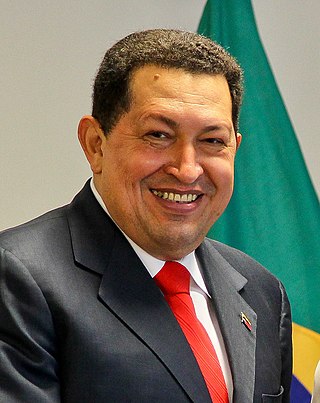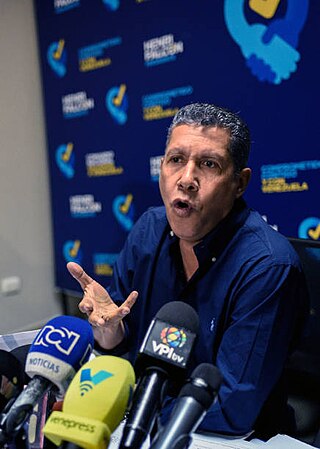
The politics of Venezuela are conducted under what is nominally a federal presidential republic, but is in practice an authoritarian system of government. Prior to the early 1990s, Venezuela was considered an unusually long-standing and stable liberal democracy in Latin America, having transitioned to democracy in 1958. According to the V-Dem Democracy indices Venezuela was in 2023 the third least electoral democratic country in Latin America.

Hugo Rafael Chávez Frías was a Venezuelan politician and military officer who served as the 52nd president of Venezuela from 1999 until his death in 2013, except for a brief period of forty-seven hours in 2002. Chávez was also leader of the Fifth Republic Movement political party from its foundation in 1997 until 2007, when it merged with several other parties to form the United Socialist Party of Venezuela (PSUV), which he led until 2012.
The Fifth Republic Movement was a socialist political party in Venezuela. It was founded in July 1997, following a national congress of the Revolutionary Bolivarian Movement-200, to support the candidacy of Hugo Chávez, the former President of Venezuela, in the 1998 presidential election. The "Fifth Republic" refers to the fact that in 1997 the Republic of Venezuela was the fourth in Venezuelan history, and the Movement aimed to re-found the Republic through a constituent assembly. Following Chávez' 1998 election victory, this took place in 1999, leading to the 1999 Constitution of Venezuela.

The Bolivarian Revolution is an ongoing political process in Venezuela that was started by Venezuelan President Hugo Chávez, the founder of the Fifth Republic Movement and later the United Socialist Party of Venezuela (PSUV), and his successor Nicolás Maduro. The Bolivarian Revolution is named after Simón Bolívar, an early 19th-century Venezuelan revolutionary leader, prominent in the Spanish American wars of independence in achieving the independence of most of northern South America from Spanish rule. According to Chávez and supporters, the Bolivarian Revolution seeks to build an inter-American coalition to implement Bolivarianism, nationalism and a state-led economy.
Bolivarianism is a mix of panhispanic, socialist and nationalist-patriotic ideals named after Simón Bolívar, the 19th-century Venezuelan general and liberator from the Spanish monarchy then in abeyance, who led the struggle for independence throughout much of South America.

Socialist Appeal was the British section of the International Marxist Tendency (IMT), founded in 1992 alongside the IMT by supporters of Ted Grant and Alan Woods after they were expelled from the Militant tendency of the Labour Party. In 2024 the Great Britain-based elements of the IMT were relaunched as the Revolutionary Communist Party.

Presidential elections were held in Venezuela on 6 December 1998. The main candidates were Hugo Chávez, a career military officer who led a coup d'état against then-president Carlos Andrés Pérez in 1992; and former Carabobo Governor Henrique Salas Römer. Both candidates represented newly formed parties, a first in a country where the main candidates always represented the parties of the bipartisanship. Chávez represented the Fifth Republic Movement (MVR), while Salas Römer represented Project Venezuela. Initially weak in the polls, Chávez ran on an anti-corruption and anti-poverty platform, condemning the two major parties that had dominated Venezuelan politics since 1958; and began to gain ground in the polls after the previous front runners faded. Despite the fact that the major parties endorsed Salas Römer, Chávez was elected into his first term as President of Venezuela.

Elections in Venezuela are held at a national level for the President of Venezuela as head of state and head of government, and for a unicameral legislature. The President of Venezuela is elected for a six-year term by direct election plurality voting, and is eligible for re-election. The National Assembly (Asamblea Nacional) has 277 members (diputados), elected for five-year terms using a mixed-member majoritarian representation system. Elections also take place at state level and local level.

The Movement for Socialism is a democratic socialist political party in Venezuela.

The Radical Cause, stylized as La Causa Я, is a minor left-wing political party in Venezuela, and today part of the Venezuelan opposition to president Nicolás Maduro.

Francisco Javier Arias Cárdenas is a Venezuelan politician and career military officer, and was the governor of Zulia state. He participated in Hugo Chávez's unsuccessful February 1992 coup attempt, being pardoned in 1994 by Rafael Caldera, along with the other conspirators. He was elected Governor of Zulia state in 1995 for the Radical Cause, and challenged Hugo Chávez for the presidency in 2000. He subsequently served as Venezuelan Ambassador to the UN, and deputy to the National Assembly after the 2010 parliamentary elections.
For Social Democracy, abbr.PODEMOS, is a political party in Venezuela. In the 2005 legislative elections the party won 15 out of 165 seats in the National Assembly.
Chavismo, also known in English as Chavism or Chavezism, is a left-wing populist political ideology based on the ideas, programs and government style associated with the Venezuelan President between 1999 and 2013 Hugo Chávez that combines elements of democratic socialism, socialist patriotism, Bolivarianism, and Latin American integration. People who supported Hugo Chávez and Chavismo are known as Chavistas.

The United Socialist Party of Venezuela is a socialist political party which has been the ruling party of Venezuela since 2007. It was formed from a merger of some of the political and social forces that support the Bolivarian Revolution led by President Hugo Chávez.

Henri Falcón Fuentes is a Venezuelan politician, lawyer, and retired Bolivarian Army non-commissioned officer. He served as mayor for two consecutive terms of Barquisimeto, Iribarren Municipality from 2000 to 2008 and as Governor of Lara from 2008 until 2017. He was a candidate in the 2018 Venezuelan presidential election.

Bolivarian propaganda is a form of nationalist propaganda, especially in Venezuela and associated with chavismo, Venezuelan socialism. This type of propaganda has been associated with Hugo Chávez's Bolivarian Revolution, which used emotional arguments to gain attention, exploit the fears of the population, create external enemies for scapegoat purposes, and produce nationalism within the population, causing feelings of betrayal for support of the opposition.

The Popular Revolutionary Alternative is a Venezuelan Chavista political coalition made up of socialist and leftist parties critical of the administration of Nicolás Maduro.
Movement for Direct Democracy was a Venezuelan far-left political party, which was officially founded in April 2000. It was dissolved on January 7, 2007, after its leadership decided to merge MDD with the newly founded United Socialist Party of Venezuela (PSUV) in support of Bolivarian Revolution led by Hugo Chávez. MDD describes itself as a civic-military political movement that identifies with the Bolivarian and Anti-Capitalist ideals, it focuses on promoting Bolivarian Revolution and Direct Democracy throughout South American continent.
Venezuelan Revolutionary Currents is a Venezuelan far-left political party that was officially founded in 2000, the party's secretary general is Ramses Reyes. CRV is currently a part of the GGP, an alliance of various left-wing political parties and social movements that support the Bolivarian Revolution promoted by former president of Venezuela Hugo Chávez Frías. It is currently not authorized to participate in elections due to its legal problems.

Emergent People is a Venezuelan centrist political party, founded on June 22, 1991 by Fernando Alvarez.













